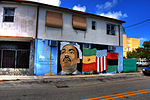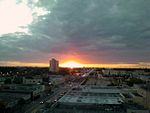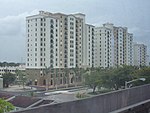Umoja Village
The Umoja Village shantytown was founded on October 23, 2006, in the Liberty City section of Miami, Florida, in response to gentrification and a lack of low-income housing in Miami. The name Umoja is Swahili for "unity", hence "Unity Village". After months of planning, a group calling itself Take Back the Land seized control of a vacant lot on the corner of 62nd St. and NW 17th Ave. The lot had been vacant for about eight years after low-income housing there was demolished by the City of Miami. Take Back the Land erected several tents and then built wood-frame shanties in order to provide housing for otherwise homeless people in the area. Police, City of Miami and Miami-Dade County officials were unable to evict the residents or organizers due to the landmark 1996 Pottinger Settlement. After years of arresting homeless people, the city of Miami was sued by the Miami ACLU; they eventually settled. In the settlement, the city agreed that homeless people could not be arrested if they met the following criteria: The individual is homeless; the individual is situated on public land; there are no beds available at homeless shelters in the city; and the individual is engaged in "life sustaining conduct," such as eating, sleeping, bathing, "responding to calls of nature," congregating and building "temporary structures" to protect oneself from the elements. Take Back the Land used the legal settlement to build a shantytown in Miami. By the end of December, the Village housed approximately 50 otherwise homeless people, and made the news in The Miami Herald, the Sun-Sentinel, the Los Angeles Times, Time.com and The New York Times, as well as a number of documentaries and blogs. Residents ran the Village, voting to build, distribute donations, move in new residents and evict others. Umoja Village enjoyed broad support in the community, and, therefore, was able to successfully repel numerous attempts by government officials to evict them.
Excerpt from the Wikipedia article Umoja Village (License: CC BY-SA 3.0, Authors).Umoja Village
Northwest 17th Avenue, Miami
Geographical coordinates (GPS) Address Nearby Places Show on map
Geographical coordinates (GPS)
| Latitude | Longitude |
|---|---|
| N 25.832 ° | E -80.2246 ° |
Address
Northwest 17th Avenue 6201
33147 Miami
Florida, United States
Open on Google Maps




